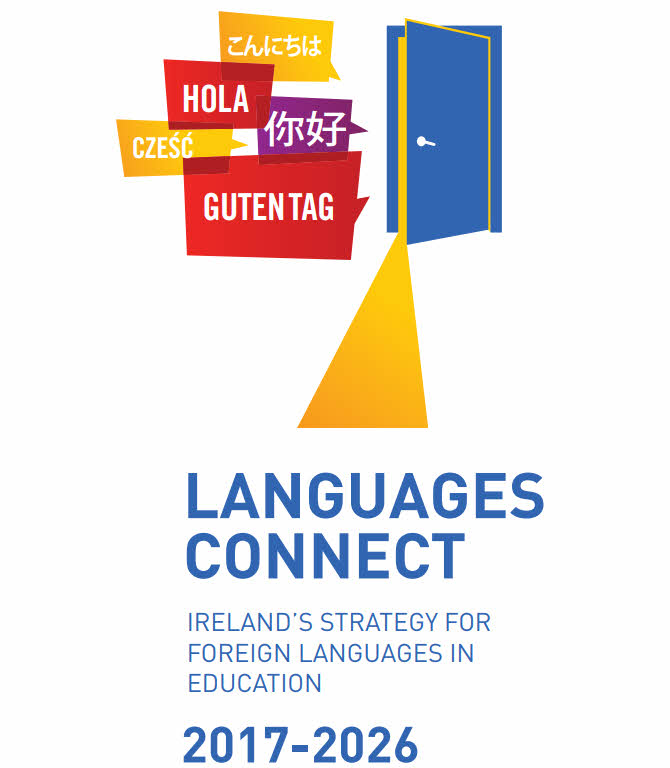Ireland’s Strategy for Foreign Languages in Education explains why languages are so important!
Why learn foreign languages?
Language is one of the means by which we think, organise our knowledge, express our thoughts and feelings, and communicate and connect with others.
We live in a world which is rich in languages and Ireland has its own linguistic heritage. Irish and English and the many other languages used in Ireland today are part of our unique, ever-evolving cultural and linguistic identity. As citizens of Europe and the world, we are also exposed to many other languages and cultures.
Knowledge of foreign languages is essential for Ireland’s cultural, social and economic well-being. English may be a lingua franca of international communications, but knowing English is not enough. Competence in a number of languages is a key skill that our citizens should be encouraged to achieve. Our enhanced language diversity, predominantly due to the arrival of immigrants from almost 200 countries since 2000, is a social, cultural and national resource to be welcomed and nurtured. In a changing, multicultural and multilingual Ireland, knowing and being aware of the languages and cultures of our immigrants is important for social cohesion.
The European Framework of Key Competences for Lifelong Learning (2007) recognises the ability to communicate in a foreign language as one of the key competences needed for personal fulfilment and development, active citizenship, social inclusion and employment. The EU’s Strategic Framework—Education and Training 2020 lists foreign language competences and attitudes as key to enhancing employability, innovation and active citizenship.
With the increasing globalisation of the world economy, and the rise of emerging non-English speaking markets as a major source of growth, the importance of foreign language skills to the economy cannot be overstated. In the world of international business, where competence in English is increasingly taken for granted, it is companies with additional foreign language capabilities and an understanding of local cultures that will enjoy competitive advantage in new markets.
In 2012, the Expert Group on Future Skills Needs (EGFSN) published a report on the skills required to trade internationally (http://www.skillsireland.ie/Publications/2012/Key-Skills-for-Enterprise-to-Trade-Internationally.html) both in existing and emerging export markets. Among the skills required are foreign languages and cultural awareness.
The National Employer Survey 2015 showed that approximately one quarter of employers indicated that they had a specific requirement for foreign language proficiency skills in their organisation.
The National Skills Strategy 2025 lists (https://www.education.ie/en/Publications/Education-Reports/National-Employer-Survey-Employers-Further-Higher-Education.pdf. p. 10) foreign languages and cultural awareness among the cross-sectoral skills which improve an individual’s employability and enable occupational mobility.
EI has identified eight languages as important for Ireland’s future skills needs (https://www.education.ie/en/Publications/Policy-Reports/pub_national_skills_strategy_2025.pdf.p. 32): German, French, Spanish, Portuguese, Mandarin Chinese, Russian, Arabic and Japanese.
A workforce possessed of significant foreign language capabilities will make Ireland a more attractive destination for investment, and provide the skills required by our indigenous companies to enable them to expand into overseas markets.
Some sentences from “Languages Connect, Ireland’s Strategy for Foreign Languages in Education 2017 – 2026”
The full document here: https://www.education.ie/en/Schools-Colleges/Information/Curriculum-and-Syllabus/Foreign-Languages-Strategy/fls_languages_connect_strategy.pdf
- “Language is one of the means by which we think, express our thoughts, communicate and connect with others. Knowledge of foreign languages is essential for Ireland’s cultural, social and economic welfare. Even though we are a small, open economy which depends on international trade and are now home to immigrants from almost 200 countries who, for the most part, have migrated here since 2000, our competency levels in foreign languages remains low. The range of languages which are offered to students by schools is not sufficiently diverse, and too few students take advantage of mobility opportunities, such as Erasmus+, to experience language immersion as part of their studies. This has led to the enterprise sector indicating that there is a shortage of graduates and sufficiently skilled people in the languages of trade and business.” P.6
- “Knowledge of at least one foreign language can enrich a person’s life experiences, and the European Framework of Key Competences for Lifelong Learning (2007) recognises the ability to communicate in a foreign language as one of the key competences needed for personal fulfilment and development, active citizenship, social inclusion and employment. In learning a foreign language, a learner opens not only career opportunities, but also the opportunity for cultural engagement and understanding.” P.6
- “English may be a global lingua franca but, in the world of international business, knowledge of English is increasingly taken for granted. It is companies with additional language capabilities and an understanding of local cultures that will enjoy competitive advantage in new but also in existing markets.” P. 40
- “Learning a foreign language is no longer a luxury for some but a necessity for most. It is an international key which upon turning will open many doors and opportunities for those that embrace and enjoy the challenge.” P. 40
Secondary students urged to learn foreign languages…
Foreign languages in preschool and primary
THE IRISH TIMES: Foreign languages could be taught in preschool and primary – Department June 2020



